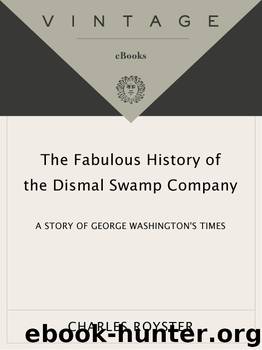The Fabulous History of the Dismal Swamp Company by Charles Royster

Author:Charles Royster [Royster, Charles]
Language: eng
Format: epub
ISBN: 978-0-307-77329-6
Publisher: Knopf Doubleday Publishing Group
Published: 2010-12-07T16:00:00+00:00
When members of the Dismal Swamp Company met in Richmond, with Reuben Lindsay attending in place of Dr. Thomas Walker, Walker was entering his seventies. His shoulders were rounded, his hair was gray. He took no more long journeys. He retained his good humor, but he was often ill. His memory had begun to fail.
Dr. Walker’s youngest son, Francis, turned twenty-one in 1785. That summer he began to manage the affairs of the Loyal Company; he visited the grant in 1785 and 1786. Three years later the Walkers contracted with Francis Preston to act as subagent, collecting rents and dealing with tenants. Among the subjects Dr. Walker had difficulty remembering were the surveying fees the Loyal Company had left unpaid for twenty-five years.
Francis Walker had a warm heart and a quick mind. He taught law to Landon Cabell. The voters of Albemarle County elected Walker to the House of Delegates. Still, he lacked ambition, preferring to live at Castle Hill with his father and stepmother and more than eighty-five slaves. He knew he would inherit the house and the plantation. Dr. Walker and Francis sometimes rode across their rolling acres near the base of a chain of hills known as the Southwest Mountains. During one such ride with several guests, Dr. Walker suddenly galloped up to his son and lashed Francis with a horsewhip, giving him “several good cuts.” Francis pulled away and asked his father why he had attacked him. Dr. Walker said: “My son, that is one of the corner-trees of your estate, & I wanted to make you remember it.” Dr. Walker had devoted a large part of his life to land and its boundaries. If memory failed, those memories should fade last.
Francis Preston served the Walkers as subagent less than four years. He was subject to a difficulty of which many knew but few spoke: Francis Walker, with several of his brothers and sisters, was “liable to intoxication.” On two visits to Castle Hill, Preston found Walker too drunk to deal with Loyal Company business. According to gossips, Dr. Walker himself “had a strong propensity this way, which however, his prudence & fortitude mastered, ’till he was old.” Francis had a close attachment to his “good father” and dreaded the day death would “deprive his dependents of so inestimable a friend.” One of the son’s chief pleasures was to reminisce about the winter of 1779–80 and the adventures of Dr. Walker’s surveying party as it extended Virginia’s boundary westward. Recalling his father’s vigor and humor while snowbound, Francis relived “some moments of the greatest happiness I ever enjoyed.”
Shortly before delegates to the ratifying convention gathered in Richmond, Thomas Walker wrote his will. To his other sons and sons-in-law he left bequests of varying sizes in cash or livestock. Joseph Hornsby was to receive eight white steers. Dr. Walker and his second wife, Elizabeth Thornton Walker, had signed an agreement before their wedding, by which she retained control of her property and disavowed any claim on his. Castle Hill, Dr.
Download
This site does not store any files on its server. We only index and link to content provided by other sites. Please contact the content providers to delete copyright contents if any and email us, we'll remove relevant links or contents immediately.
| African Americans | Civil War |
| Colonial Period | Immigrants |
| Revolution & Founding | State & Local |
Cat's cradle by Kurt Vonnegut(15355)
Pimp by Iceberg Slim(14508)
4 3 2 1: A Novel by Paul Auster(12392)
Underground: A Human History of the Worlds Beneath Our Feet by Will Hunt(12098)
The Radium Girls by Kate Moore(12028)
Wiseguy by Nicholas Pileggi(5786)
The Fire Next Time by James Baldwin(5446)
Perfect Rhythm by Jae(5403)
American History Stories, Volume III (Yesterday's Classics) by Pratt Mara L(5308)
Paper Towns by Green John(5191)
Pale Blue Dot by Carl Sagan(5008)
A Higher Loyalty: Truth, Lies, and Leadership by James Comey(4964)
The Mayflower and the Pilgrims' New World by Nathaniel Philbrick(4504)
The Doomsday Machine by Daniel Ellsberg(4490)
Killers of the Flower Moon: The Osage Murders and the Birth of the FBI by David Grann(4447)
The Sympathizer by Viet Thanh Nguyen(4390)
Too Much and Not the Mood by Durga Chew-Bose(4348)
The Borden Murders by Sarah Miller(4325)
Sticky Fingers by Joe Hagan(4199)
